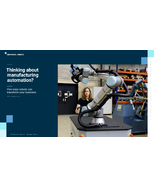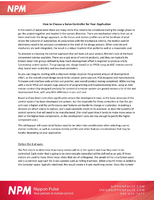New Model H1 Quantum Computer Can be Accessible via Cloud API
Share:
Press Release Summary:
- Powered by quantum charge-coupled device trapped-ion technology
- Offers 10 fully connected qubits and proven quantum volume of 128
- Features mid-circuit measurement and qubit reuse
Original Press Release:
Honeywell Releases Next Generation of Quantum Computer
- Commercial users include Merck and DHL
BROOMFIELD, Colo., Oct. 29, 2020 /PRNewswire/ -- Honeywell (NYSE: HON) today announced a breakthrough in the early era of quantum computing with the introduction of its next-generation quantum computer, the System Model H1. The H1 generation of computer features Honeywell's differentiated quantum charge-coupled device1 (QCCD) trapped-ion technology and is strategically designed to be rapidly upgraded throughout its lifetime.
The newest generation quantum computer from Honeywell initially offers 10 fully connected qubits, a proven quantum volume of 128 (the highest measured in the industry) and unique features such as mid-circuit measurement and qubit reuse, which were made possible through Honeywell's heritage of precision controls expertise. This announcement further affirms the company's commitment to rapidly increase quantum volume by at least an order of magnitude annually for the next five years.
System Model H1 is directly accessible to enterprises via a cloud application programming interface (API), as well as through Microsoft Azure Quantum, and alongside channel partners including Zapata Computing and Cambridge Quantum Computing. Access to System Model H1 is through a subscription that provides customers access to Honeywell's most technologically advanced quantum computer on the market.
"Honeywell's aggressive quantum computing roadmap reflects our commitment to achieving commercial scale for our quantum business. Our subscription-based model provides enterprise customers with access to Honeywell's most advanced system available," said Tony Uttley, President of Honeywell Quantum Solutions. "Honeywell's unique methodology enables us to systematically and continuously 'upgrade' the H1 generation of systems through increased qubit count, even higher fidelities and unique feature modifications."
Uttley offered an analogy: "Imagine if the streaming service to which you subscribed became twice as good in a few weeks, 10 times as good in a few months and thousands of times better in a few quarters," he said.
In addition to the announced H1 computer, Honeywell confirmed it has already begun integration activities for its future System Model H2 generation as well as development activities in support of its H3 generation and beyond.
Honeywell's novel trapped-ion qubits can be uniformly generated with errors better understood compared with alternative qubit technologies that do not use individual atoms. These high-performance operations require deep experience across multiple disciplines, including atomic physics, optics, cryogenics, lasers, magnetics, ultra-high vacuum, and precision control systems-- areas where Honeywell has a long heritage of experience and expertise.
"The introduction of the System Model H1 is a significant milestone in shaping and accelerating the development of quantum computing and bringing its power to enterprises," added Uttley. "We've seen demand skyrocket in 2020 and are thrilled to partner with customers seeking to solve real business problems via quantum computing."
Honeywell is also disclosing the latest enterprise companies with access to its quantum computer. That list includes DHL and Merck as well as a collaboration with Accenture. These companies demonstrate the wide range of quantum computing use cases, which include pharmaceuticals and logistics as well as Honeywell's own internal applications in its Aerospace and Performance Materials and Technologies businesses. Honeywell's differentiated technology, exemplified by the high-fidelity quantum operations and fully connected qubits with mid-circuit measurement and qubit reuse, enables customers to push the frontier of quantum computing applications.
"We believe that addressing tomorrow's global logistics challenges requires an unwavering commitment to advancing some of today's most promising technologies, and that includes Quantum Computing. By attempting to solve computationally complex problems with Honeywell, we have taken another step towards exploring improving operational efficiencies and leveraging quantum computing's potential to innovate within the logistics industry," said Justin Baird, head of innovation, Asia Pacific, for DHL Customer Solutions & Innovation.
Kam Chana, director, computational platforms at Merck said, "It was illuminating to experience the properties of real quantum hardware first-hand through Zapata's Orquestra platform. Seeing one of Orquestra's native QML algorithms run on Honeywell's H1 system was an exciting moment for Merck in our journey to quantum readiness. The combination of Orquestra's programming environment with quantum hardware opens up quantum computing widely to our data scientists and brings new approaches for development of AI/ML based models."
Honeywell is also collaborating with Accenture on new use cases for Honeywell's quantum technology. "At Accenture, we're excited to be working with quantum industry leaders as well as our clients to unlock new value through quantum computing," said Marc Carrel-Billiard, senior managing director and Technology Innovation lead at Accenture. "Working with Honeywell in this rapidly-developing space has already yielded new insights, and we look forward to exploring ways that the System Model H1 can be applied to business challenges across industries."
In addition, JPMorgan Chase has continued its collaboration with the Honeywell team. "JPMorgan Chase is pleased to continue innovating alongside Honeywell and its new System Model H1 quantum computer," says Dr. Marco Pistoia, head of research and engineering, JPMorgan Chase.
Honeywell currently has a cross-disciplinary team of more than 150 scientists, engineers, software developers and functional professionals dedicated to advancing quantum computing and addressing real enterprise problems across industries.
About Honeywell
Honeywell (www.honeywell.com) is a Fortune 100 technology company that delivers industry specific solutions that include aerospace products and services; control technologies for buildings and industry; and performance materials globally. Our technologies help aircraft, buildings, manufacturing plants, supply chains, and workers become more connected to make our world smarter, safer, and more sustainable. For more news and information on Honeywell, please visit www.honeywell.com/newsroom.
1. Quantum charge-coupled device (QCCD) was first coined in a 2002 paper "Architecture for a large-scale ion-trap quantum computer" by D. Kielpinski, C. Monroe, & D.H. Wineland printed in Nature 417, 709 (2002).
Contacts:
Media
Nati Katz
973-615-1281
netanel.katz@Honeywell.com




